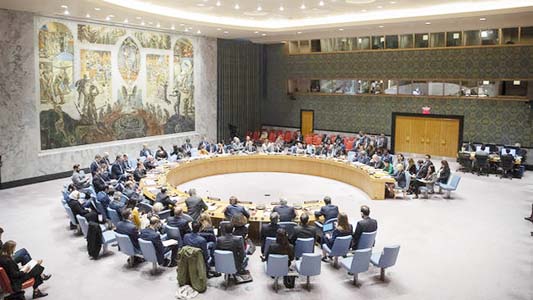
AP, United Nations :
The U.N. General Assembly voted overwhelmingly Thursday to condemn the American economic embargo of Cuba for the 28th year, rejecting U.S. criticism of human rights violations there and criticizing the Trump administration’s increasingly tough enforcement measures.
The vote in the 193-member world body was 187-3 with the U.S., Israel and Brazil voting “no,” and Colombia and Ukraine abstaining. Last year, the assembly voted 189-2 with the U.S. and Israel voting “no” and no abstentions.
For the second year, Moldova did not vote.
General Assembly resolutions are not legally binding and are unenforceable, but they reflect world opinion and the vote has given Cuba an annual stage to demonstrate the isolation of the U.S. on the embargo.
It was imposed in 1960 following the revolution led by Fidel Castro and the nationalization of properties belonging to U.S. citizens and corporations. Two years later it was strengthened.
Brazil’s conservative government, led by President Jair Bolsonaro, was the first in Latin America to vote against the resolution in at least five years.
“Brazil will stand alone with this in the region, and what that shows is that being close to the United States is a key priority, and basically that it is more important than voting together with other Latin American countries,” Oliver Stuenkel, an expert at the Getulio Vargas Foundation in Sao Paulo said.
Cuba’s Foreign Minister Bruno Rodriguez said the Trump administration has “aggressively intensified” implementation of the embargo against other countries, and has tried to prevent the arrival of shipments to Cuba “by resorting to sanctions and threats against vessels, shipping companies and insurance companies.”
“It does not conceal its intention which is economically to suffocate Cuba and to increase damage, scarcities and hardships on our people,” he said.
U.S. Ambassador Kelly Craft told the assembly that the United States, like all nations, can choose who to trade with so “it is worrying” that the international community, in the name of protecting Cuba’s sovereignty, continues to challenge this right.
“But what is even more concerning is that every year, this body entertains the claim that the Cuban regime has no other choice than to abuse its own people in response to the embargo,” she said.
Craft pointed to the arrest of Cuban human rights defender Jose Ferrer and other advocates last month on what she called fabricated charges.
The U.N. General Assembly voted overwhelmingly Thursday to condemn the American economic embargo of Cuba for the 28th year, rejecting U.S. criticism of human rights violations there and criticizing the Trump administration’s increasingly tough enforcement measures.
The vote in the 193-member world body was 187-3 with the U.S., Israel and Brazil voting “no,” and Colombia and Ukraine abstaining. Last year, the assembly voted 189-2 with the U.S. and Israel voting “no” and no abstentions.
For the second year, Moldova did not vote.
General Assembly resolutions are not legally binding and are unenforceable, but they reflect world opinion and the vote has given Cuba an annual stage to demonstrate the isolation of the U.S. on the embargo.
It was imposed in 1960 following the revolution led by Fidel Castro and the nationalization of properties belonging to U.S. citizens and corporations. Two years later it was strengthened.
Brazil’s conservative government, led by President Jair Bolsonaro, was the first in Latin America to vote against the resolution in at least five years.
“Brazil will stand alone with this in the region, and what that shows is that being close to the United States is a key priority, and basically that it is more important than voting together with other Latin American countries,” Oliver Stuenkel, an expert at the Getulio Vargas Foundation in Sao Paulo said.
Cuba’s Foreign Minister Bruno Rodriguez said the Trump administration has “aggressively intensified” implementation of the embargo against other countries, and has tried to prevent the arrival of shipments to Cuba “by resorting to sanctions and threats against vessels, shipping companies and insurance companies.”
“It does not conceal its intention which is economically to suffocate Cuba and to increase damage, scarcities and hardships on our people,” he said.
U.S. Ambassador Kelly Craft told the assembly that the United States, like all nations, can choose who to trade with so “it is worrying” that the international community, in the name of protecting Cuba’s sovereignty, continues to challenge this right.
“But what is even more concerning is that every year, this body entertains the claim that the Cuban regime has no other choice than to abuse its own people in response to the embargo,” she said.
Craft pointed to the arrest of Cuban human rights defender Jose Ferrer and other advocates last month on what she called fabricated charges.

